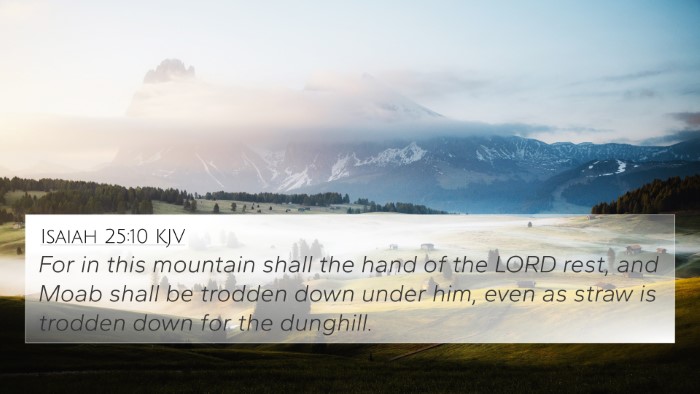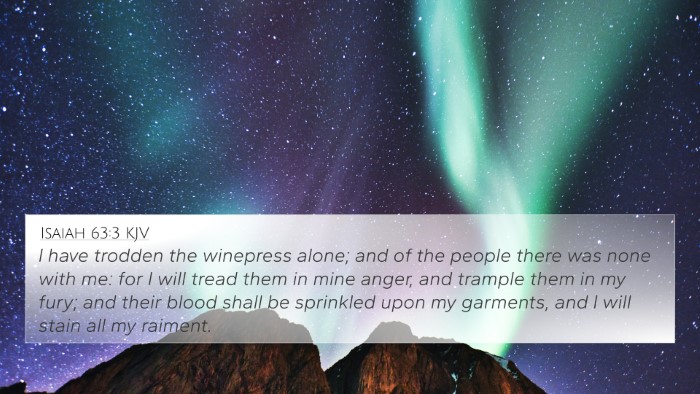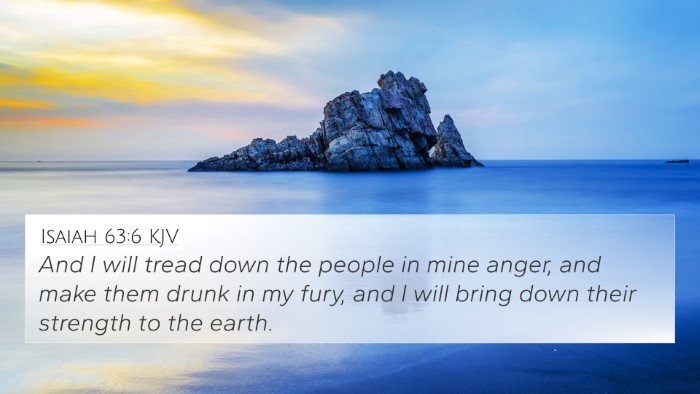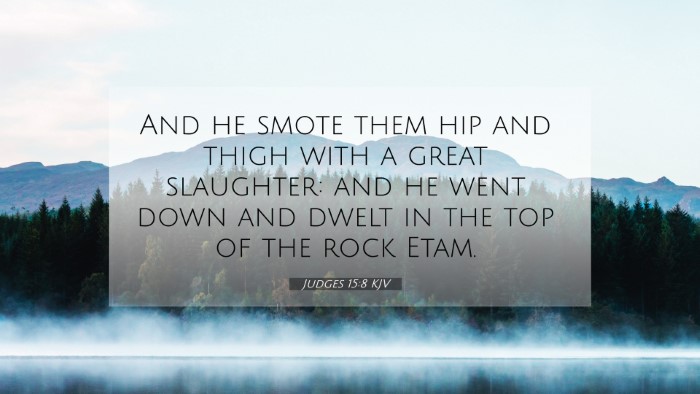Old Testament
Genesis Exodus Leviticus Numbers Deuteronomy Joshua Judges Ruth 1 Samuel 2 Samuel 1 Kings 2 Kings 1 Chronicles 2 Chronicles Ezra Nehemiah Esther Job Psalms Proverbs Ecclesiastes Song of Solomon Isaiah Jeremiah Lamentations Ezekiel Daniel Hosea Joel Amos Obadiah Jonah Micah Nahum Habakkuk Zephaniah Haggai Zechariah MalachiJudges 15:8 Similar Verses
Judges 15:8 Cross References
And he smote them hip and thigh with a great slaughter: and he went down and dwelt in the top of the rock Etam.
Uncover the Rich Themes and Topics of This Bible Verse
Listed below are the Bible themes associated with Judges 15:8. We invite you to explore each theme to gain deeper insights into the Scriptures.
Judges 15:8 Cross Reference Verses
This section features a detailed cross-reference designed to enrich your understanding of the Scriptures. Below, you will find carefully selected verses that echo the themes and teachings related to Judges 15:8 KJV. Click on any image to explore detailed analyses of related Bible verses and uncover deeper theological insights.

Isaiah 25:10 (KJV) »
For in this mountain shall the hand of the LORD rest, and Moab shall be trodden down under him, even as straw is trodden down for the dunghill.

Isaiah 63:3 (KJV) »
I have trodden the winepress alone; and of the people there was none with me: for I will tread them in mine anger, and trample them in my fury; and their blood shall be sprinkled upon my garments, and I will stain all my raiment.

Isaiah 63:6 (KJV) »
And I will tread down the people in mine anger, and make them drunk in my fury, and I will bring down their strength to the earth.
Judges 15:8 Verse Analysis and Similar Verses
Understanding Judges 15:8
In Judges 15:8, we see a powerful moment in the life of Samson, one of the most iconic figures in the Bible. This verse captures the essence of Samson's character and the judgments of Israel's enemies during his time. Here, we will delve into the meaning of this verse, drawing insights from notable public domain commentaries.
Verse Text
Judges 15:8 (KJV): "And he smote them hip and thigh with a great slaughter: and he went down and dwelt in the top of the rock Etam."
Verse Summary
This verse highlights the fierce retribution that Samson exacted upon the Philistines after they mistreated his family. By using the phrase "hip and thigh," the scripture emphasizes the severity and completeness of his victory over them.
Commentary Insights
Matthew Henry's Commentary
Matthew Henry explains that Samson's action was a direct response to the treachery he faced from the Philistines. He notes that "hip and thigh" suggests a thorough and decisive defeat, indicating Samson's strength and the might of the Spirit upon him. This act was not merely personal revenge; it signified God's judgment on the Philistines for their oppression of Israel.
Albert Barnes' Notes
Albert Barnes examines the cultural context of the phrase "hip and thigh," suggesting it may denote a brutal, hand-to-hand combat style. Barnes underscores the intensity of Samson's rage against the injustices suffered by his people and highlights God's deliverance through Samson as a reminder of divine retribution.
Adam Clarke's Commentary
Adam Clarke provides a historical perspective on this moment, noting the significance of Samson's retreat to the rock of Etam, which symbolizes a place of safety and preparation for future confrontations. Clarke emphasizes that even in retreat, God was positioning Samson for further actions against the Philistines, who had become a continual source of oppression for Israel.
Bible Cross-References
- Judges 14:6 - Highlights the Spirit of the Lord coming upon Samson, empowering him for victory.
- Judges 16:30 - Demonstrates another instance of Samson's strength against the Philistines.
- 1 Samuel 7:10 - God's deliverance of Israel from their enemies, reflecting a similar pattern of divine intervention.
- Hebrews 11:32-34 - References Samson as a man of faith who achieved great exploits.
- Exodus 15:3 - Discusses God as a man of war, establishing the Biblical theme of divine vengeance.
- Psalm 18:34 - Speaks to God training the hands of His servants for war, paralleling with Samson’s actions.
- 2 Corinthians 10:4 - Discusses the spiritual warfare that believers engage in, linking to Samson's physical conflict.
Connections with Other Bible Verses
The actions of Samson in Judges 15:8 can be compared to various other Biblical narratives that involve divine retribution against Israel's enemies and the providence of God in raising up deliverers:
Comparative Analysis
- David vs. Goliath (1 Samuel 17) - Both narratives showcase individual champions raised by God to confront Israel's foes.
- Elijah and the Prophets of Baal (1 Kings 18) - Highlights the theme of God demonstrating power over pagan adversaries.
- Moses vs. Pharaoh (Exodus 14) - Displays God's deliverance through His chosen leaders in the face of oppression.
- Judges 4-5 - Deborah and Barak - Shows how God raises leaders to bring victory over enemy forces.
Thematic Connections
The thematic elements evident in Judges 15:8 resonate throughout the Bible:
- Divine Justice: The retribution against oppressors is a recurring theme.
- Faith and Deliverance: Just as Samson trusted in God for victory, many figures in the Bible exhibit similar faith.
- Strength through Weakness: Samson's strength was highlighted through God's empowering presence.
Conclusion
Judges 15:8 represents a significant moment in the narrative of Israel's struggle against the Philistines. By examining this verse alongside the insights from Matthew Henry, Albert Barnes, and Adam Clarke, we discover a rich depth of meaning that transcends its historical context. Furthermore, the cross-references and thematic connections weave a broader understanding of God’s providence and justice throughout scripture.
For those studying the Bible, utilizing tools for cross-referencing and a comprehensive Bible concordance will enhance understanding and reveal the intricate connections between Biblical texts. Engaging in a cross-reference Bible study can make these themes clearer and foster a deeper appreciation of the scriptures.


